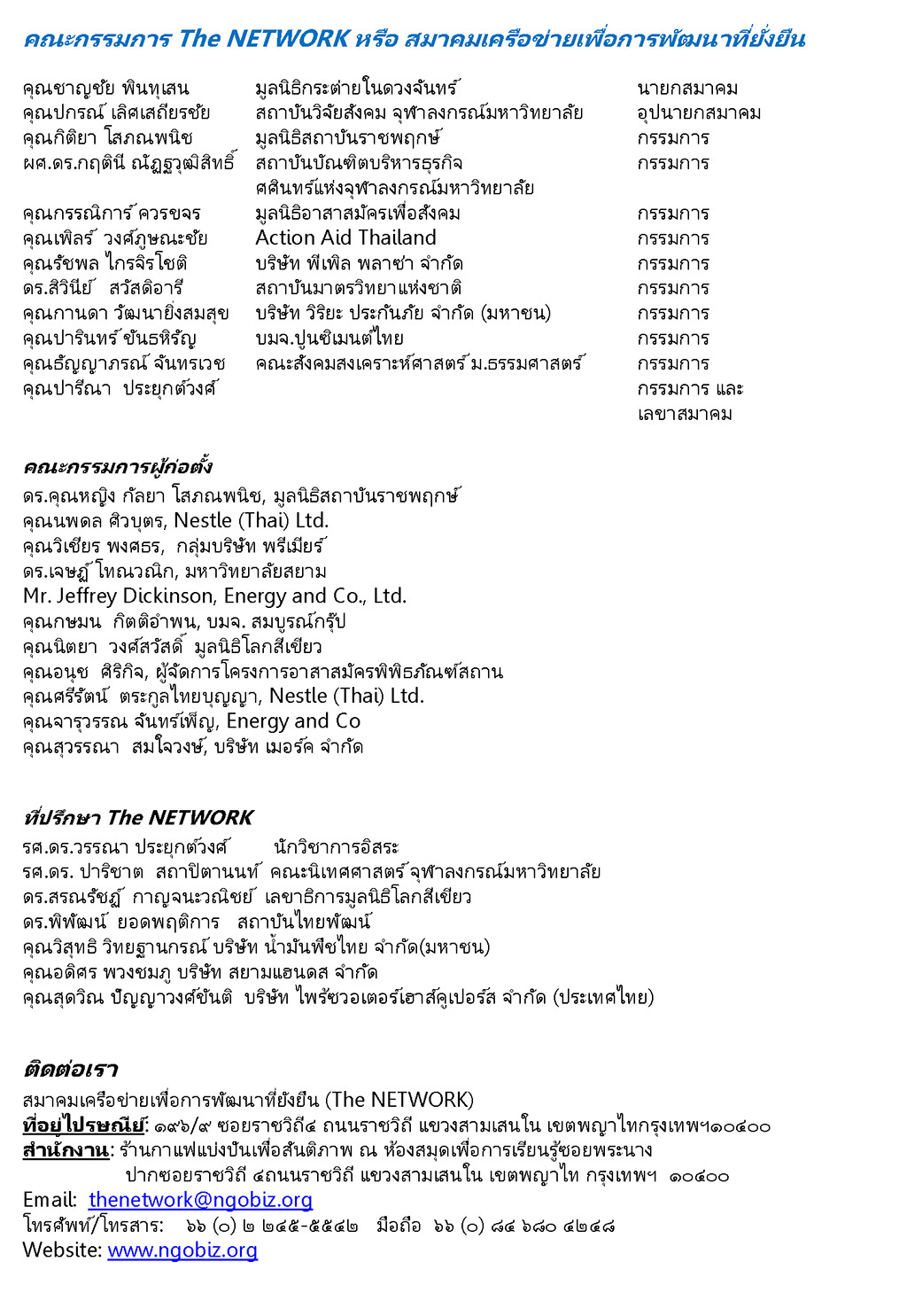




Mandate
|
FAQsWhat will attract the NGO community to the Network? NGOs in Asia and the Pacific, like elsewhere, often find it difficult to plan for long-term objectives as traditional sources of revenue typically provide only temporary funding. These NGOs now seek partnerships with the private sector to secure financial management skills, marketing strategies, volunteers, and new funding sources. In addition, a new role for many NGO in the 21st Century is to help engage the business sector in social development – a role that finds increasing acceptance among firms undertaking corporate social responsibility programs. What will attract the business community to the Network? Mr. Masamitsu Sakurai, President and CEO of Ricoh Group, has stated that “in this era in which companies no longer control the market but in which the market selects the company, Ricoh recognizes that it is no longer an option for companies to fulfill their corporate social responsibilities – it (CSR) is a basic requirement.” More and more businesses share this view and are performing voluntary actions above and beyond their legal obligations to promote both their own competitive interests, as well as the interests of wider society. These firms are taking account of their economic, social, and environmental impacts on the communities in which they operate. How does the Network benefit both NGO and Private Sector? In the 21st Century, global forces have changed the private sector and NGO landscape and hence the interaction between them. NGOs and private sector entities increasingly recognize their many areas of common ground and the potential synergies generated through collaboration – from philanthropy to community development, expansion of private supply channels to advocacy. Cooperation can make an important contribution to sustainable development and improvement of the quality of life for Asian and Pacific societies. In this perspective, NGO and private sector can benefit from the following: • NGOs are able explore partnerships with the private sector to strengthen entrepreneurial and financial management skills, develop marketing strategies, secure volunteers to carry out projects, cultivate new funding sources, and strengthen advocacy efforts to effect change. • Businesses gain knowledge and networks to fully implement their new strategies. Alliances with NGOs, especially those engaged in service delivery and other operational work, provide years of hands-on project experience at the grassroots level. What is the Network? The new network of NGO and business members in Asia and the Pacific has been formed to explore collaboration between the two communities to work towards sustainable development. The Network provides a space on the web for NGO and private sector to announce their requirements and search for collaboration, an open forum for sharing and exchanging best practices, information, opinions, and concerns. Who are the supporters of the Network? Asian Development Bank-NGO Center (ADB-NGOC) and GlaxoSmithKline Biologicals (GSK Bio) organized the three-day workshop from 28-30 March 2004 in Pattaya, Thailand, on “Building NGO-Private Sector Partnerships against Poverty” in partnership with the Population & Community Development Association (PDA). The workshop led participants from different countries in Asia and the Pacific to discuss how NGO and private sectors cooperate to fight against poverty. ADB-NGOC and GSK Bio continues their support by setting up a Secretariat to coordinate workshop participants and new members towards NGO and private sector cooperation. When was the Network established? The Network emerged from a workshop held 28-30 March 2004, and organized by ADB, NGOC and GSK in partnership with PDA. The purpose was to explore methods and share case studies, strategies, perspectives, and models in which NGOs and the private sector could collaborate for socially and environmentally beneficial causes. It was formally launched on 16 February 2005. How will the Network work? The network will provide “virtual” common-ground for corporate and NGO groups from Asia and the Pacific to meet, share information, discuss common themes, and explore possibilities for partnerships through internet technology communication such as websites, email, virtual meetings and web conferencing. Mandate of the Network The network will encourage NGO and private sector cooperation by the following: • To share, exchange and explore international cases studies and best practices on NGO and private sector cooperation for sustainable development. • To strengthen the cooperation between NGO and private sector • To encourage In-Country Workshops on NGO & Private Sector Cooperation • To provide opportunities for NGO and Private Sector collaboration, project placement and project solicitation. • To conduct bi-annual virtual meetings, to discuss tangible outcomes About the Secretariat The NETWORK, located in Bangkok, Thailand, has been selected as the Secretariat to manage a day-to-day errands. Among other activities, it serves as a clearinghouse of information, enlists participants, guides initiatives, and provides regular updates on NGO-business partnerships for sustainable development. How to contact the Secretariat
|


